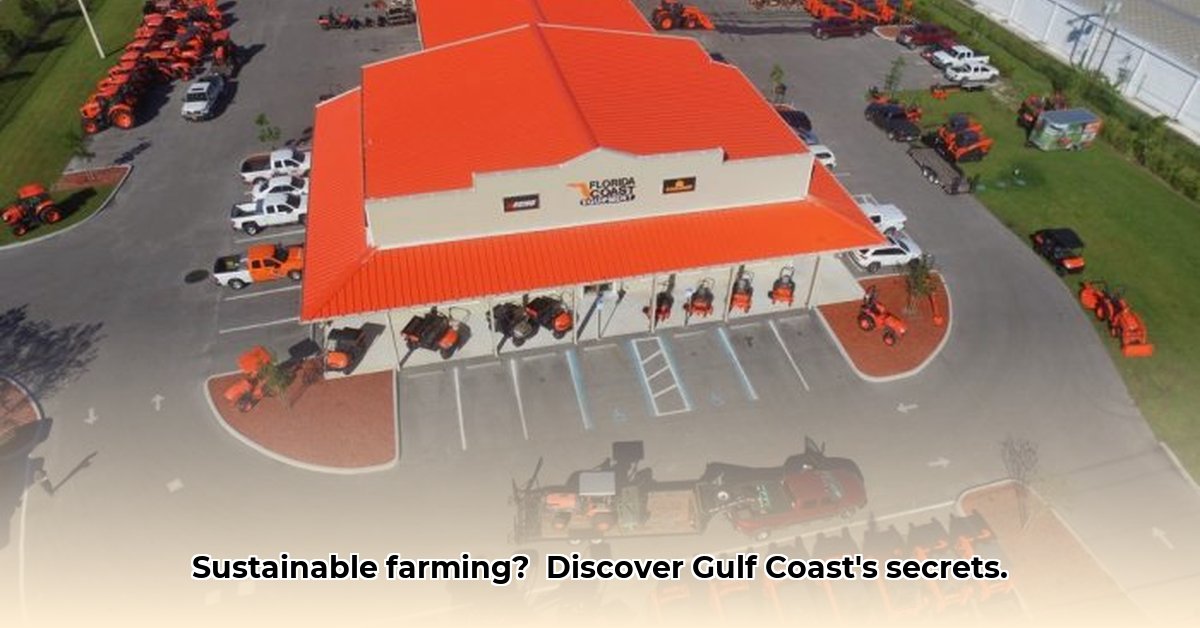
The 2021 merger of Gulf Coast Tractor and Florida Coast Equipment reshaped Florida's agricultural landscape, providing farmers with enhanced access to modern, sustainable farming solutions. This expansion raises a critical question: How will this increased reach translate into a greener future for Florida agriculture? The answer lies in the availability and adoption of environmentally friendly technologies and practices. For more information on equipment warranties, see our warranty page.
Sustainable Farming in Florida: A New Era of Opportunity
The combined entity's broadened reach offers significant potential for advancing sustainable agriculture in Florida. This merger offers farmers a wider selection of equipment and expertise to implement environmentally sound farming practices. But how can farmers and businesses leverage this opportunity? Let's explore some practical steps.
For Farmers:
- Fuel Efficiency: Maximize Savings, Minimize Impact
Fuel efficiency is paramount for both profitability and environmental responsibility. Researching fuel-efficient tractors and equipment is crucial. Start by comparing fuel consumption rates (often expressed in gallons per hour) from manufacturers and independent reviews. Consider factors like engine type (diesel generally offers better fuel economy than gasoline for agricultural use) and transmission (Continuously Variable Transmissions or CVTs often provide better fuel efficiency). Finally, calculate potential annual fuel cost savings by switching to more efficient equipment. This analysis justifies the investment in greener technology.
- Precision Agriculture: Optimizing Resource Use
Precision agriculture technologies offer significant environmental benefits. These tools allow for more efficient use of resources like water and fertilizer, leading to higher crop yields with reduced environmental impact. Explore options like GPS-guided tractors, variable-rate fertilizer applicators, and soil sensors that provide real-time data on soil conditions. While initial investment and a learning curve are involved, the long-term benefits to your bottom line, the environment, and soil health are substantial.
- Government Incentives: Accessing Financial Support
Investigate state and federal programs designed to support sustainable farming practices and the purchase of eco-friendly equipment. These incentives can significantly offset the costs associated with adopting greener technologies. Contact your local agricultural extension office or conduct online research to uncover available initiatives in your area. Don't miss out on potential financial assistance that can make sustainable farming more accessible.
For Florida Coast Equipment:
- Data-Driven Decision Making: Monitoring Progress
Closely monitor sales data to track the adoption rate of eco-friendly equipment. This data provides valuable insights for inventory management, marketing strategies, and future product planning. Understanding which sustainable practices and equipment are most successful allows for adaptation and refinement of services.
- Strategic Marketing: Showcasing Green Solutions
Develop focused marketing campaigns emphasizing the environmental advantages and cost savings associated with sustainable equipment. Utilize case studies showcasing local farmers' successes with eco-friendly technology to demonstrate its viability and benefits. Highlighting both environmental and economic advantages is key to attracting a wider customer base.
- Invest in Employee Training: Empowering Expertise
Invest in training programs for your staff, focusing on sustainable agricultural practices. Well-trained employees can provide superior customer service and technical support, ensuring farmers successfully integrate new technologies. This investment in human capital strengthens your commitment to sustainable agriculture and benefits both your employees and your customers.
Fuel Efficiency in Florida Agriculture: A Deep Dive
Choosing fuel-efficient farm equipment is critical in Florida's unique agricultural climate. High temperatures and diverse crops necessitate equipment optimized for both performance and efficiency.
Understanding Fuel Efficiency Metrics: PTO vs. Drawbar
Manufacturers report fuel consumption using PTO (Power Take-Off) and drawbar horsepower. PTO measures fuel use when powering implements directly from the tractor's engine, while drawbar measures fuel consumption under pulling conditions. Understanding the difference is crucial for accurate comparisons based on your primary farm tasks.
Evaluating Tractor Models for Efficiency
Several factors influence a tractor's fuel efficiency:
Engine Type and Size: Diesel engines generally offer better fuel economy than gasoline for agricultural applications. However, choose an appropriately sized engine to avoid fuel wastage.
Transmission Type: CVTs provide superior fuel efficiency by allowing the engine to operate at its optimal speed.
Weight and Size: Smaller, lighter tractors consume less fuel for lighter tasks.
Technological Features: Look for features like engine auto-shutdown and advanced power management systems.
Data Comparison: Consult independent sources (e.g., Nebraska Tractor Test Laboratory) for verified fuel consumption data and compare models under similar operating conditions.
Implementing Fuel-Saving Practices and Long-Term Strategies
Beyond equipment selection, operational practices significantly impact fuel efficiency. Regular maintenance, precision agriculture techniques, proper implement selection, and well-trained operators are all key to reducing fuel consumption. Explore using biofuels and government incentive programs to further enhance your farm's sustainability.
Key Takeaways:
- The Gulf Coast Tractor and Florida Coast Equipment merger presents a significant opportunity for promoting sustainable agriculture in Florida.
- Farmers can significantly improve their environmental impact and financial standing by embracing fuel-efficient equipment and precision agriculture technologies.
- Florida Coast Equipment must proactively promote and support sustainable practices.
The success of this merger hinges on a collective commitment to sustainable agriculture, requiring proactive efforts from all stakeholders. By working together, a more environmentally responsible and prosperous future for Florida's agricultural industry can be achieved.